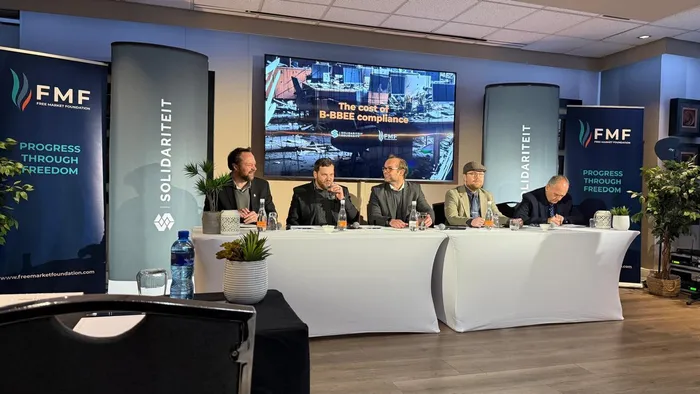Cosatu defends B-BBEE policy amid criticism from Solidarity and FMF
BEE

The Free Market Foundation and Solidarity held a media briefing on Thursday to discuss the impact of Black Economic Empowerment legislation on the economy.
Image: Supplied
Banele Ginidza
The battle for the scrapping of "race laws" in South Africa went a notch up on Thursday as the Congress of South African Trade Unions (COSATU) shot down a call to review and drop South Africa's Broad-Based Black Economic Empowerment (B-BBEE) policy.
This comes as trade union Solidarity and the Free Market Foundation (FMF) on Thursday released a report claiming that B-BBEE has caused serious damage to the country’s economy and to its population while only enriching a small, politically-connected elite.
The report draws on data from the B-BBEE Commission, Stats SA, the JSE, and international comparisons to assess the real costs of compliance across the key BEE scorecard elements: ownership, skills development, enterprise and supplier development, management control, and socio-economic development.
According to the report, the annual cost of BEE compliance is between R145 billion and R290bn per year. It claimed that this has resulted in an annual reduction of 1.5% to 3% in economic growth, and to an annual loss of between 96 000 and 192 000 jobs.
“Our findings show that BEE, as currently designed, is enriching a small elite while throttling economic dynamism and deepening unemployment,” said Dr Morné Malan, FMF senior associate and co-author of the report, speaking at the joint press conference.
The study compares South Africa’s model with global “affirmative action” policies in Malaysia, India, Brazil, the US, and Namibia, showing that South Africa’s version is the most intrusive and economically damaging.
At the media briefing, the organisations claimed that B-BBEE benefits largely captured by politically-connected elites as South Africa now ranks 139th in GDP per capita, down from 87th in 1994.
Executives of both organisations said the people most affected by the current economic programme are people that work poor people and those that are beneficiaries are the elite.
"That is why we will engage with Cosatu trade unions Numsa and others to find alternatives to the current racial legislation," said Theuns du Buisson, economic researcher at the Solidarity Research Institute, and co-author of the report.
"In the second place we will continue to litigate and in the third place we will also put pressure on SA via the international world and continue to put pressure on South Africa with the outside world especially the G20 that comes."
However, Cosatu's Parliamentary spokesperson Matthew Parks said the report provided no breakdown backed up by actual research as to any financial burden to the state nor how B-BBEE has been an obstacle to growing the economy and reducing unemployment.
Parks said the report strangely cited statistics related to real and potential growth overall, but no evidence of the relationship between those and B-BBEE. He said it may as well have blamed constitutional democracy for South Africa's economic challenges.
"No reference is made to the need to overcome our still prevalent racial divides as evidenced by countless employment equity studies confirming that most senior positions in the private sector are held by White males or that economic ownership, including shares on the JSE remain largely White-held," Parks said.
Johann Rossouw, an economist at Altitude Wealth, said a more sensible empowerment model as an alternative to B-BBEE policies was Black Economic Skills Transfer (BEST), which would help with job creation and carry the economy into the future.
"At the moment all the arguments are about how many ways to cut the existing pie instead of growing the pie that we have for the future. Black empowerment is not a policy of the government of national unity," Rossouw said, commending that the study was evidence based and drew comparison with other countries.
"It is important that the GNU makes its own policies that will benefit the average poor."
However, independent economist Duma Gqubule said the study and the report was fake news on steroids, which lacked the fundamental understanding of the objectives of transformation.
Gqubule said the report lacked empirical evidence and was premised on companies counting upskilling workers for an example as a transformation contribution when both the worker and the company benefited from the exercise.
"I would call on black business to come up with a coherent response to this. It is a dangerous agenda. We need another citizen dialogue on black empowerment for the new circumstances as the situation in the 1990s when the policies were crafted were critical," Gqubule said.
BUSINESS REPORT